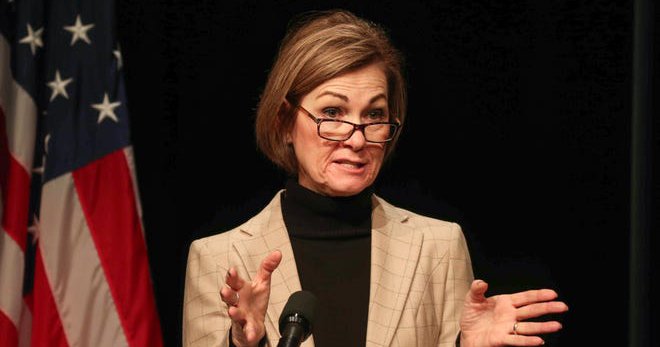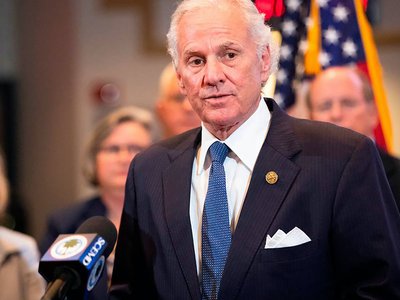Iowa ended its 2021 budget year with a surplus of more than $1.2 billion, Gov. Kim Reynolds announced Monday.
Officials in both major political parties offered competing theories for the financial windfall.
Republicans, who control the Iowa Legislature and governor's office, credited the $1.24 billion surplus to conservative budgeting practices. Democrats countered that the budget looks rosier than it is because Reynolds is shoring up the state's finances with federal pandemic relief dollars that she opposed.
Reynolds touted the surplus Saturday at her annual Harvest Festival fundraiser and repeated her pledge to follow up on a wide-ranging tax cut she signed into law this year with further cuts.
"We will continue to cut taxes in Iowa," she said. She's previously said Iowa will look at lowering individual income taxes next year.
At the same time, Reynolds pledged to fund key state programs.
"This surplus proves we accomplished exactly what we set out to do — overcome the financial challenges caused by the global pandemic and invest in education, workforce, health care, agriculture and technology," Reynolds said in a statement. "We will continue to invest in these important priorities going forward to meet the needs of our citizens and state."
Democrats have criticized Reynolds and legislative Republicans for not using more of the state's money to pay for needs like housing and health care that were made more urgent by the COVID-19 pandemic.
Instead, they say she's taking credit for a record surplus while using federal stimulus dollars — including relief passed only by congressional Democrats — to shore up the state's finances.
"The truth is Gov. Reynolds adamantly opposed the key budget drivers that aided Iowa’s economic recovery — new child tax credits for families, lower health insurance premiums, and new investments in Iowa public schools," Rep. Chris Hall, D-Sioux City, the top Democrat on the House Appropriations Committee, said in a statement.
As an example, Hall pointed to an affordable housing initiative Reynolds announced this month that will tap $100 million of federal American Rescue Plan funds in addition to $230 million the Iowa Legislature has allocated over five years.
Reynolds has also used federal COVID-19 relief funds to pay to expand broadband access, to provide rent relief, to shore up Iowa's unemployment trust fund and more.
"There are a lot of areas where the governor has funded normal operating expenses by using federal dollars," Hall said in a follow-up interview. "And at the same time, some of the global expenses have actually been less of a cost to the state because of COVID than they would be normally. And so that kind of gives the appearance of an inflated ending balance."
Joel Anderson, the state's interim budget director, who was appointed to the job by Reynolds, said the surplus was the result of Iowa bringing in more money than projected from sales tax and corporate and individual income taxes.
"It wasn’t necessarily that it was from us using COVID relief funds on certain things," he said. "This was Iowans and taxpayers (who) generated more tax receipts."
The state's fiscal year ended June 30, but the state releases final budget figures at the end of September, after paying and receiving any outstanding obligations. Iowa ended the previous fiscal year with a surplus of $305.5 million.
The state's Revenue Estimating Conference, a three-person panel that predicts how much money the state will take in each year, will meet next month to update its revenue projections for the current fiscal year, which began July 1. Those estimates will help give lawmakers a better sense of the state's financial picture heading into next year.
The Republican-controlled Iowa Legislature this year passed a sweeping tax cut package that phases out Iowa's inheritance tax, cuts income taxes and lowers county property taxes by shifting mental health funding from counties to the state's general fund.
While a few Democrats supported the tax cuts, most voted against them.
When she signed that legislation in June, Reynolds promised additional tax cuts were still to come.
"We are not done yet," she said at the time. "Next year we’ll be back, and I’ll be proposing to cut our personal income taxes even further."






